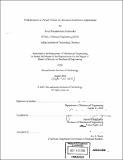| dc.contributor.advisor | Gareth H. McKinley. | en_US |
| dc.contributor.author | Deshmukh, Suraj Sharadchandra, 1978- | en_US |
| dc.contributor.other | Massachusetts Institute of Technology. Dept. of Mechanical Engineering. | en_US |
| dc.date.accessioned | 2012-09-13T18:52:08Z | |
| dc.date.available | 2012-09-13T18:52:08Z | |
| dc.date.copyright | 2003 | en_US |
| dc.date.issued | 2003 | en_US |
| dc.identifier.uri | http://hdl.handle.net/1721.1/72801 | |
| dc.description | Thesis (S.M.)--Massachusetts Institute of Technology, Dept. of Mechanical Engineering, 2003. | en_US |
| dc.description | Includes bibliographical references (p. 122-129). | en_US |
| dc.description.abstract | Energy management is of vital concern in the automotive industry and many components need to satisfy stringent 'impact-safe' requirements. These energy absorption requirements conflict with the design demands for more compliant, thinner materials leading to a conflict of stiffness problem. A 'novel' energy absorbing material that adapts to environmental conditions and user specifications has been conceptualized, designed, modeled and tested in the present work. This adaptive energy absorbing material consists of an elastomeric foam impregnated with a field-responsive fluid such as a magnetorheological fluid or a shear-thickening fluid. Stable and inexpensive magnetorheological (MR) fluids based on carbonyl iron powder have been synthesized in the laboratory. The rheological properties, including the field dependent yield-stress, of the fluid have been measured at magnetic fields varying from 0.0 to 0.4 Tesla using a custom-built fixture for the AR 2000/ 1000N rheometers. Steady shear rheological experiments and transient creep tests have also been performed on a shear-thickening fluid consisting of 56% w/w corn-starch in water. The large, reversible changes in the rheological behavior of field-responsive fluids have been utilized for controlling the stress-strain behavior and energy absorption characteristics of cellular solids. The mechanical properties of 'dry' and field-responsive fluid-impregnated cellular solids have been determined using Texture Analyzer modified with a custom-built attachment. Foams impregnated with MR fluids have shown a tremendous improvement in the energy-absorption capacity. The energy absorbed per unit volume at moderate magnetic fields (B ~/~ 0.2 T) has been found to increase by 30 to 50 times as compared to the energy absorbed at zero-field. A 'two-layer' scaling model has been proposed to explain the increase in the foam plateau stress based on an assumption that the MR fluid forms a secondary layer on the solid edges of the foam and determines the composite elastic modulus. Experiments have been carried out to determine the effect of control parameters such as the magnetic field, volume fraction of the fluid impregnating the foam and the strain rate on the mechanical behavior of the composite. The magnetic field has been varied from 0.0 to 0.2 T, the volume fraction from 0% to 60% and the strain rate from 0.02 to 2.0 s-1. All the experimental data has been found to collapse onto a single master curve using appropriate shift factors based on the proposed theoretical model. Impact testing using a 'drop-ball' test apparatus, built in-house, has been performed for a scaled down headrest model. Designs for an adaptive headrest and various automotive components have also been described in detail. The present work has thus presented a 'novel' class of conformable field-responsive fluid based composites that can be used for rapidly switching energy absorbing applications. | en_US |
| dc.description.statementofresponsibility | by Suraj Sharadchandra Deshmukh. | en_US |
| dc.format.extent | 129 p. | en_US |
| dc.language.iso | eng | en_US |
| dc.publisher | Massachusetts Institute of Technology | en_US |
| dc.rights | M.I.T. theses are protected by
copyright. They may be viewed from this source for any purpose, but
reproduction or distribution in any format is prohibited without written
permission. See provided URL for inquiries about permission. | en_US |
| dc.rights.uri | http://dspace.mit.edu/handle/1721.1/7582 | en_US |
| dc.subject | Mechanical Engineering. | en_US |
| dc.title | Field-responsive ('Smart') fluids for advanced automotive applications | en_US |
| dc.title.alternative | Field-responsive fluids for advanced automotive applications | en_US |
| dc.title.alternative | Smart fluids for advanced automotive applications | en_US |
| dc.type | Thesis | en_US |
| dc.description.degree | S.M. | en_US |
| dc.contributor.department | Massachusetts Institute of Technology. Department of Mechanical Engineering | |
| dc.identifier.oclc | 54537916 | en_US |
